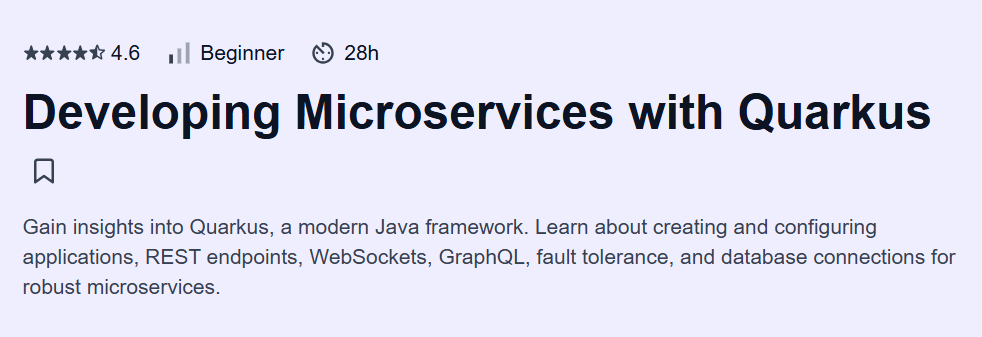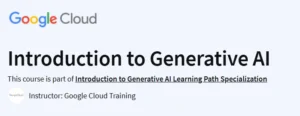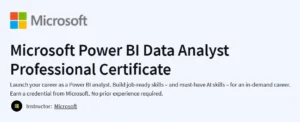What will you learn in Developing Microservices with Quarkus Course
Familiarity with core components of the Quarkus framework and its development workflow
Hands-on experience creating and configuring Quarkus applications from the CLI or Maven plugin
Ability to develop RESTful web services with JAX-RS, document them via OpenAPI/Swagger, and consume REST clients
Practical knowledge of bi-directional WebSocket servers and GraphQL endpoints in Quarkus
Techniques for ensuring fault tolerance (health checks, retries, circuit breakers) in microservices
Program Overview
Module 1: Introduction to Quarkus & Project Setup
⏳ 30 minutes
Topics: Quarkus philosophy (container-first, native images), tooling (CLI, Maven plugin)
Hands-on: Bootstrap a “Hello, Quarkus” project and explore live-coding hot-reload
Module 2: Building RESTful Services
⏳ 1 hour
Topics: JAX-RS resources, dependency injection with CDI, JSON serialization
Hands-on: Create CRUD endpoints and document them with OpenAPI annotations
Module 3: REST Client & API Documentation
⏳ 1 hour
Topics:
RestClientinterfaces, registering and consuming external APIs, generating Swagger UIHands-on: Integrate a third-party HTTP service and verify interactive API docs
Module 4: WebSockets in Quarkus
⏳ 45 minutes
Topics: Annotated endpoints (
@ServerEndpoint), session management, broadcasting messagesHands-on: Build a chat microservice that pushes real-time updates to connected clients
Module 5: GraphQL Endpoints
⏳ 45 minutes
Topics: Defining GraphQL schema with SmallRye, queries vs. mutations, payload mappings
Hands-on: Expose a GraphQL API for querying and modifying domain objects
Module 6: Fault Tolerance & Health Checks
⏳ 45 minutes
Topics: MicroProfile Fault Tolerance (
@Retry,@CircuitBreaker), liveness/readiness probesHands-on: Secure endpoints with retry logic and implement custom health-check procedures
Module 7: Persistence & Database Integration
⏳ 1 hour
Topics: Panache ORM vs. plain JDBC, transaction management, reactive clients
Hands-on: Connect to PostgreSQL, define entities, and perform CRUD operations with Panache
Module 8: Capstone Project – Microservice Application
⏳ 1 hour
Topics: Bringing it all together—REST, WebSockets, GraphQL, fault tolerance, and persistence
Hands-on: Develop a small microservice suite that demonstrates all learned features
Get certificate
Job Outlook
Java Microservices Developer: $90,000–$140,000/year — build cloud-native services with Quarkus and container platforms
Backend Engineer: $80,000–$130,000/year — design scalable REST/GraphQL APIs and ensure service resilience
Full-Stack Java Developer: $95,000–$150,000/year — integrate Quarkus back ends with modern front-end frameworks
Specification: Developing Microservices with Quarkus Course
|
FAQs
- No prior C++ experience required; beginner-friendly.
- Introduces procedural programming concepts applied to game logic.
- Guides learners through modular and testable code practices.
- Hands-on exercises include enums, RNG, and control flow.
- Perfect first project for understanding core C++ constructs.
- Complete game built in under 45 minutes.
- Includes player input, validation, and error handling.
- Implements round outcome logic with conditional statements.
- Tracks scores and allows repeated rounds via loops.
- Final module covers testing, edge-case handling, and cleanup.
- Refactor code into reusable helper functions.
- Split I/O, game logic, and score tracking for clarity.
- Encourages readable and maintainable code.
- Teaches splitting code into headers and modules.
- Builds good habits for future software development.
- Hands-on C++ project demonstrates coding ability.
- Provides experience in procedural programming and logic implementation.
- Enhances portfolio with a complete, functional project.
- Prepares for technical interviews with fundamental exercises.
- Serves as a stepping stone toward junior developer positions.
- Console-based game only; no GUI or graphics.
- Limited complexity—ideal for first-time projects.
- Focuses on core C++ concepts rather than advanced algorithms.
- Extremely fast, project-focused learning experience.
- Suitable for learners seeking a hands-on, beginner-friendly introduction.





